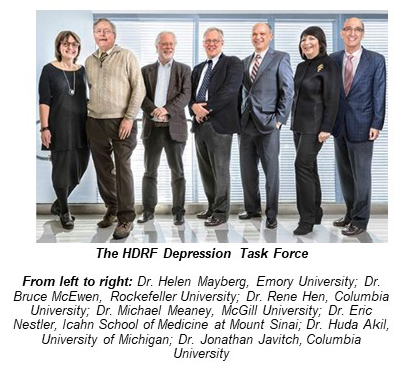HDRF Depression Task Force: Researchers’ Exciting New Findings,
October 5, 2017
Since 2012, the acclaimed researchers of HDRF’s Depression Task Force (DTF) have worked tirelessly to better understand the brain biology of depression in order to develop a new type of anti-depressant, one that works differently from the 20-plus drugs already on the market. Finding a new option is crucial, since 50% of patients do not respond fully to available anti-depressants.
We are delighted to announce that the Depression Task Force is closer than ever to achieving this bold goal: A recent major paper authored by the entire team reveals they have discovered novel, tangible approaches to new treatments, and they are ready to drive these discoveries from animal testing to clinical trials.
The article, “Treatment Resistant Depression: A Multi-scale, Systems Biology Approach,” appears online this month in the prestigious journal Neuroscience and Biobehavioral Reviews, and will soon be in print. Working together, the seven investigators of the DTF have found new candidate mechanisms for treatment in a relatively short amount of time. It is a brilliant example of collaboration across multiple laboratories and universities.
Here are the highlights:
- They have identified a circuit deep in the brain that appears to play a key role in depression.
- The circuit is not in just one area of the brain, but connects four hubs that regulate emotion.
- Specific patterns of neurons within the circuit become over-active or under-active in depression.
- They have started to map the genetic architecture of these regions, and identify how the architecture changes in depression.
- As a result, they have identified not just precise micro-circuits, but underlying genes that seem to play a key role in depression.
To read the entire paper, please click here.
The publication marks an exciting five-year milestone for our research plan. The DTF is now preparing small, pilot clinical trials of potential therapies, entering into a more mature phase of drug discovery with a handful of promising molecular targets.
As clinical trials commence, the DTF will continue work to find a physical diagnosis for depression and identify different depression subtypes. It is not far-fetched to imagine that in the next decade we will see a whole new generation of treatments – be it drug, brain stimulation or psychotherapy — that work precisely where they are needed.
Yes, there is much hard work ahead. We can’t help but marvel at all that we’ve accomplished, and with your help, all that we will accomplish. Thank you as always for your support of our research mission.


